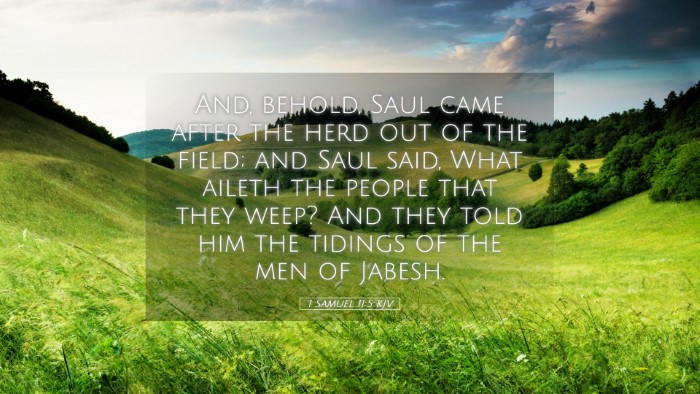Commentary on 1 Samuel 11:5
Bible Verse: "And, behold, Saul came after the herd out of the field; and Saul said, What ails the people that they weep? And they told him the tidings of the men of Jabesh." (1 Samuel 11:5)
Introduction
This verse is set against the historical backdrop of Israel's struggle and cries for deliverance. Saul's emergence in this narrative marks a significant turning point in the history of Israel. Public domain commentaries provide profound insights into the theological implications and historical context surrounding this verse.
Contextual Analysis
Historical Context: The period of Saul's rise corresponds to a time of chaos and distress among the Israelite tribes, especially due to the threat posed by the Ammonites. The fate of Jabesh-gilead is pivotal, representing the vulnerability of the Israelite communities in the face of external threats.
Theological Implications: Saul's response to the people's distress reflects a central theme in Samuel's narrative: God's choice of leaders. His initial ignorance of the situation foreshadows both his potential and his future failures as king.
Saul's Reaction and Its Significance
Matthew Henry's Insight: Henry comments on Saul's inquiry into the people's weeping, highlighting that it shows his concern even before he has assumed the role of leader. This latent ability to empathize with his people is significant because it foreshadows his eventual role as sovereign and judge.
Albert Barnes's Observation: Barnes emphasizes that Saul was returning from a mundane task, indicating that he was not immediately oriented towards leadership. His coming out of the field symbolizes a transition from common life into a divinely appointed role. It illustrates how divine calling can interrupt ordinary life.
Adam Clarke's Commentary: Clarke emphasizes that Saul, at this moment, is portrayed in a humble state. His inquiry about the people's distress suggests a natural disposition for compassion—a crucial trait for a king. Clarke notes the significance of Saul not yet being fully aware of the divine mission laid before him.
The Role of the People of Jabesh-Gilead
The situation of Jabesh-Gilead acts as a catalyst for Saul’s leadership to emerge. The plight of the city was a microcosm of Israel's collective fears.
- Cries for Help: The people of Jabesh-Gilead symbolize the dire need for immediate deliverance, presenting a thematic parallel to God's deliverance throughout Israel's history.
- Covenant Community: This incident highlights the importance of community and the shared need for leadership that arises in moments of crisis.
Framing the Divine Plan
Matthew Henry’s Perspective: Henry asserts that this moment illustrates the providence of God in raising rulers in times of need. Saul's unaware involvement becomes a testament to God's sovereign election.
Albert Barnes’ Observations: Barnes points out that the calamity faced by Jabesh-Gilead and the congregation’s sorrow act as the divine backdrop to Saul's emerging kingship, underscoring God’s direction in the affairs of nations and individuals.
Lessons for Today
Empathy in Leadership: The character of Saul serves as an example of how effective leaders are those who genuinely inquire about the well-being of their communities. This is particularly relevant for today’s pastors, students, and theologians who aspire to be compassionate leaders.
The Divine Hand in Crisis: The providence seen in this passage reminds believers today to trust in God’s control over societal turmoil and the role of leadership in addressing crises.
Conclusion
1 Samuel 11:5 invites readers to reflect on the complexities inherent in the appointment of leadership. It reminds us that God raises leaders in moments of need, and that empathy and awareness are crucial components of effective leadership. As we study this verse and its implications, may we embrace the lessons of attentiveness, communal responsibility, and the recognition of divine providence in our own lives.


